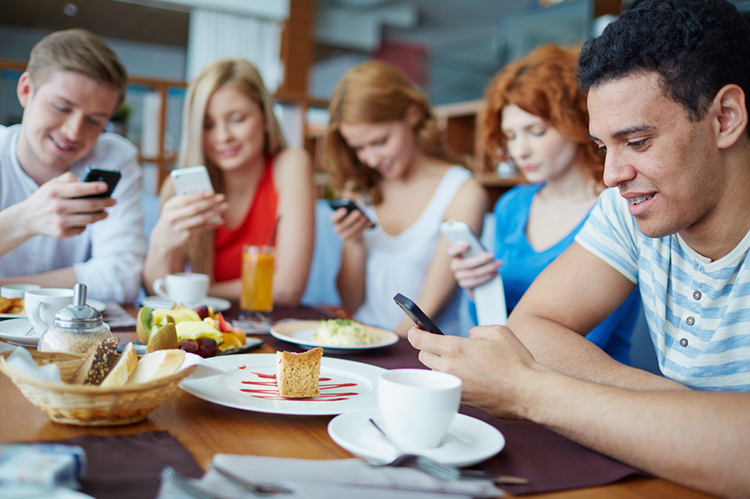National Cellphone Courtesy Month
Daniel Calabretta 2017-07-08
In the network-connected age we live in, the phrase “please, put your phone away” may very well be the hardest thing to hear — never mind to accept and follow. With the advent and prevalence of social media, as well as the ability to tether various personal and business email accounts to one’s phone, texting and driving and using mobile devices in a meal setting are becoming more pervasive. To counter such actions, this month, we put the phone down.
July marks National Cellphone Courtesy Month, a time dedicated to gradually detaching yourself from your cellphone. Sharon Schweitzer, etiquette expert and founder of Protocol & Etiquette Worldwide, outlines 10 modern cellphone manners and etiquette tips for everyone to be cognizant of not only for this month, but also year-round. Schweitzer mentions useful techniques, such as: the “hidden cellphone,” keeping your phone out of sight in a business, date or casual setting; the “silent smartphone,” which involves either completely turning off your cellphone in social settings or switching it to silent or vibrate mode; and lastly, the advice that you should “consider content carefully.” One should be wary and cautious as to what one sends over text message, email and social media. “Once it’s out there — it’s out there.” It’s not cliché; it’s the truth. Other advice Schweitzer offers includes politely excusing one’s self from a situation if the phone call is an emergency, responding promptly after missing a call or text, and not using one’s cellphone as a “crutch” when one is feeling awkward or uncomfortable.
Please find a list of Schweitzer’s “10 modern cellphone manners and etiquette tips” below:
1. Hidden cellphone: Whether you are attending an important business meeting, on a date or in a casual setting with friends and family, keep your phone out of sight. Placing your phone on the table or desk sends the clear message that the people you are with are not your No. 1 priority.
2. Silent smartphone: It’s polite and responsible to turn off your cellphone before meetings, meals and meaningful moments — like dates! If you can’t turn your device off, turn it to silent or vibrate. Your phone is not a replacement for an in-person meeting.
3. Exceptions: There are exceptions to every rule: A) Doctors, nurses, first responders and health providers; B) Those expecting emergency calls; C) Those who have an infant with a babysitter or a person with a caregiver; D) Those momentarily sharing photos with others; and E) Those researching an important request, such as directions.
4. Excuse me: If accepting an emergency call, excuse yourself as quietly and calmly as possible from the gathering with an apology. For example, “I apologize; however, this is urgent. Please excuse me. I will return in a moment.”
5. Consider content carefully: With cellphones, spontaneity can be contagious. Remember, once a text, tweet or post is sent, it’s live. Sure, you can delete it, but it’s out there on the Internet, just waiting to bite you back. According to a YouGov Omnibus survey, 57 per cent of Americans regret a text or social media post they’ve sent. So, use common sense and don’t post inappropriate photos, or text while consuming adult beverages. Avoid profanity. Consider these tips when the urge strikes to send a spontaneous message:
- Step away from your phone, take a deep breath and count to 30 to attempt to dissolve negative emotions toward the receiver;
- Ask a friend to advise whether your content is appropriate; and
- Carefully consider the repercussions — are you making a valid contribution or a faux pas?
6. Respond promptly: When you miss a call, text or email, respond in an appropriate and timely manner by apologizing for missing their message. Then respond with substance.
7. 10-foot rule: When making or taking a call, move 10 feet away from the nearest building, including windows. No one wants to see you nervously pacing or gesturing during your conversation. Step outside when responding to a call while in a house of worship, medical office, library, theatre or hospital. Refrain from confidential conversations on planes, trains and automobiles.
8. Don’t talk & drive: Many cities now ban smartphone use while driving. If you must use the phone, drive to a safe area away from traffic. New vehicle technology comes with integrated, hands-off Bluetooth options. If your vehicle has this technology, be attentive to the road and use caution. Safety first!
9. The cellular crutch: Your phone isn’t a gadget to turn to when you are not sure what to do in uncomfortable situations. If you walk into a new office or a wedding reception and don’t know anyone, take time to engage face-to-face. Deferring back to your phone as a crutch will keep you from truly connecting with new people. Practise improving your face-to-face interactions by turning your cellphone off, or leaving it hidden in the car.
10. Focus attention toward other hobbies: We tend to use our phones everywhere — at parties, at work, before we go to sleep. This dramatically affects how much, or how little, we accomplish daily. Make a conscious effort to focus on projects without the distraction of constantly checking your phone for emails, texts or surfing the web.















































































No Comment